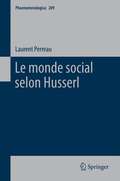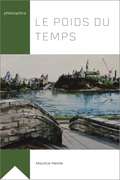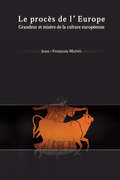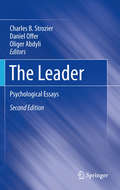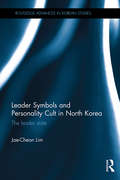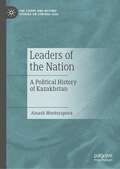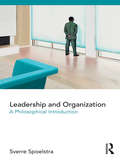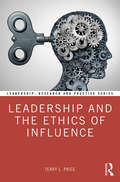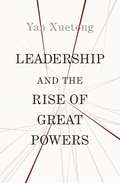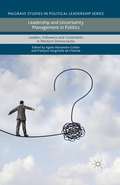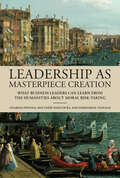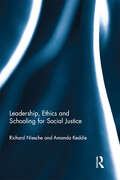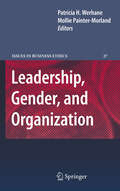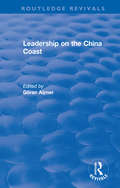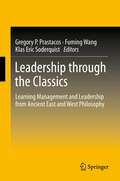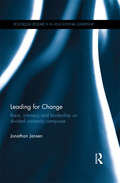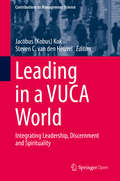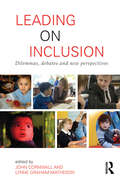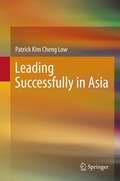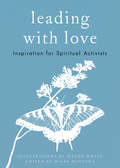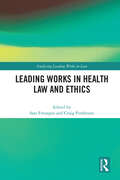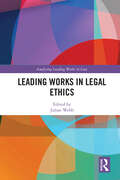- Table View
- List View
Le Moment marxiste de la phénoménologie française: Sartre, Merleau-Ponty, Trần Đức Thảo (Phaenomenologica #231)
by Alexandre FeronEntre la fin de la Seconde Guerre mondiale et le début des années 1960, certaines des figures majeures du courant phénoménologique en France, Jean-Paul Sartre, Maurice Merleau-Ponty et Trần Đức Thảo, considèrent que le projet d’articuler marxisme et phénoménologie constitue l’un des principaux enjeux de la philosophie dans le monde contemporain. L'objet de cet ouvrage est de comprendre la spécificité du travail philosophique effectué par chacun de ces penseurs sur ces deux courants de pensée apparemment incompatibles afin de rendre possible leur synthèse. L'auteur retrace la manière dont le projet initial de 1944 a été progressivement mis en question et reconfiguré au contact des mutations politiques et historiques, des débats philosophiques et du développement des sciences humaines. Ce volume, qui s’adresse aux étudiants et chercheurs, met ainsi en lumière les enjeux et les innovations conceptuelles de ce qui reste l'un des moments les plus féconds et originaux de la philosophie française contemporaine.This text covers the period between the end of the Second World War and the beginning of the 1960s, when the phenomenological school in France was represented by Jean-Paul Sartre, Maurice Merleau-Ponty and Tran Duc Thao, who endeavored to combine Marxism with phenomenology as the major task of philosophy in the modern world. The object of this text is to understand the specificity of the philosophical work each performed on these two apparently incompatible schools of thought, in order to make their synthesis possible. The author traces the way in which the initial project of 1944 was progressively questioned and reworked in the wake of political and historical change, philosophical debates and the development of human sciences. This volume appeals to students and researchers while bringing to light the underlying stakes and conceptual innovations of what remains one of the most fertile and original moments in contemporary French philosophy.
Le monde social selon Husserl
by Laurent PerreauCette étude est consacrée à l'examen de la théorie du monde social qui se découvre dans la phénoménologie d'Edmund Husserl : est-elle à même de dire les phénomènes sociaux, sur quel mode et avec quels résultats ? Dans un premier moment, nous reconstituons le propos des deux « ontologies sociales » qui pensent le monde social en son essence et en ses essences : d'une part, l'ontologie de la région « monde social », subordonnée à la région de l'« esprit » et élaborée à partir d'une phénoménologie de la communication ; d'autre part, l'ontologie morphologique et eidétique des formes essentielles de communautés sociales. Dans un second moment, nous suivons l'élaboration d'une « sociologie transcendantale » qui reconsidère le rapport de la subjectivité transcendantale au monde social. Nous montrons comment les développements de la théorie de la personne dans la perspective de la phénoménologie génétique, qui semblent nous détourner de la considération de sa socialité, précisent en réalité le rapport du sujet personnel au monde social sous l'angle de sa « mienneté », de l'habitualité et de la familiarité d'une part, et dans la perspective d'une éthique sociale d'autre part. On établit enfin comment, autour de la Krisis, la théorie du monde de la vie fournit le cadre théorique d'une « sociologie transcendantale » qui se développe, sur le fond d'une anthropologie du monde commun, comme théorie de la générativité. De l'ontologie sociale à la sociologie transcendantale, cette recherche est conçue comme une investigation des ressources et des difficultés de la voie par l'ontologie d'accès à la réduction transcendantale, relativement à la question du « social ». Remarquable enquête menée sur l'expérience sociale du sujet, la phénoménologie husserlienne du monde social est susceptible d'intéresser le sociologue comme le philosophe qui s'interroge sur la nature du « social » en général.
Le poids du temps (Philosophica)
by Maurice HenrieDes réflexions sur des sujets essentiels, notamment la politique – car pendant de longues années, Maurice Henrie a travaillé à l’ombre des parlementaires fédéraux –, des questions d’ordre littéraire et des sujets de nature socioéconomique. Ici, la plume est au service de la libre pensée, sans censure. Elle aborde une foule de sujets dans des textes regroupés selon leur appartenance et leur orientation. Du côté de la politique, par exemple, Henrie explore l’affinité entre le député et ses électeurs, le régime traditionnel des poids et des contrepoids dans les débats en Chambre, et les vicissitudes qui accompagnent tout gouvernement au pouvoir. Côté littérature, il évoque le mystère des succès littéraires, les malentendus de bon aloi qui dominent la littérature et les misères de l’écrit dans un monde où dominent l’électronique et l’informatique. Découvrez la version livre audio de ce titre, lu en version intégrale par Étienne Panet-Raymond.
Le Procès de l'Europe: Grandeur et misère de la culture européenne (Philosophica)
by Jean-François MattéiL’Europe se trouve aujourd’hui en position d’accusée, souvent par les Européens eux-mêmes, du fait de sa prétention à l’universalité, de sa supériorité proclamée et de son arrogance intellectuelle. Qu’elle n’ait pas toujours été fidèle à ses principes, lors de la colonisation des autres peuples, ne met pourtant pas en cause sa légitimité. La critique de l’Europe n’est en effet possible qu’à l’aide des normes juridiques et des principes éthiques qu’elle a diffusés auprès de tous les peuples pour connaître le monde plutôt que pour le juger.Levinas n’avait donc pas tort de louer «la générosité même de la pensée occidentale qui, apercevant l’homme abstrait dans les hommes, a proclamé la valeur absolue de la personne et a englobé dans le respect qu’elle lui porte jusqu’aux cultures où ces personnes se tiennent et où elles s’expriment.» Il faut en prendre son parti : il n’y a pas plus d’égalité des cultures que de relativisme des valeurs. On ne saurait faire le procès de l’universel sans faire appel à la culture qui a donné cet universel en partage aux autres cultures.
The Leader
by Charles B. Strozier Daniel Offer Oliger AbdyliThis volume examines the lives of prominent leaders from ancient Greece to the present. It explores how these leaders imposed their individual missions and mystiques on others, thereby fulfilling , and sometimes creating, distinct needs in their followers.
Leader Symbols and Personality Cult in North Korea: The Leader State (Routledge Advances in Korean Studies)
by Jae-Cheon LimThe legitimacy of the North Korean state is based solely on the leaders’ personal legitimacy, and is maintained by the indoctrination of people with leader symbols and the enactment of leadership cults in daily life. It can thus be dubbed a "leader state". The frequency of leader symbols and the richness and scale of leader-symbol-making in North Korea are simply unrivalled. Furthermore, the personality cults of North Korean leaders are central to people’s daily activity, critically affecting their minds and emotions. Both leader symbols and cult activities are profoundly entrenched in the institutions and daily life, and if separated and cancelled, the North Korean state would be transformed. This book analyses North Korea as a "leader state", focusing on two elements, leader symbols and cult activities. It argues that these elements have been, and continue to be, the backbone of North Korea, shaping North Korean culture. To reveal the "leader state" character, the book specifically examines North Korea’s leadership cults, its use of leader symbols in these cults, and the nature of the symbolism involved. How has the North Korean state developed the cult of the Kim Il Sung family? How does the state use leader symbols to perpetuate this cult? How has the state developed myths and rituals that sustain the cult in daily life? What leader images has state propaganda manufactured? How does the state’s manipulation of leader symbols affect the symbolism that is assigned to the leader’s actions? In answering these questions, this book sheds new light on the strength and resilience of the North Korean state, and shows how it has been able to survive even the most difficult economic period of the mid-1990s. Leader Symbols and Personality Cult in North Korea will be essential reading for students and scholars of North Korea, Korean politics, Asian politics, political sociology and visual politics.
Leaders of the Nation: A Political History of Kazakhstan (The Steppe and Beyond: Studies on Central Asia)
by Ainash MustoyapovaThe book tells about people who lived in an era of historical cataclysms, wars and revolutions, changes in political formations. The generation of the Kazakh intelligentsia responded to the historical challenge facing the Kazakhs at a turning point in history. These are people born at the end of the 19th century, educated in different countries and united by the idea of overcoming colonial dependence on the Russian Empire.The author aims to form a holistic view of a galaxy of outstanding personalities who, in an important historical period, were able to take responsibility for the people and their future. The history of the country is perceived through the prism of their destinies, views, activities and death.The material of the book is a biographical sketch and covers the history of Kazakhstan in the first third of the twentieth century, until the period of the Great Terror (1937–1938).
Leadership and Organization: A Philosophical Introduction
by Sverre SpoelstraThis book is a philosophical exploration of the relationship between leadership and organization. Each chapter in the book sheds light on this relationship by exploring leadership with respect to a particular theme: charisma, authority, religion, language, authenticity, image and followership. These themes are linked to popular notions of leadership, such as transformational leadership, authentic leadership and servant leadership. Offering insight into the ways in which leadership is understood in contemporary culture, the main thesis of Leadership and Organization is that understandings of leadership today are still shaped by the figure of the charismatic leader, even though charismatic leadership itself has lost much of its appeal. The clearest expression of this paradigm is the leadership-management distinction, where the leader is someone who transcends the organization and the manager someone who resides within the organization. Drawing on a broad variety of sources in continental philosophy, the author explores the central philosophical question of how leadership can be understood in relation to organization This book provides new perspectives on leadership that will be of interest to all students, academics and practitioners who are interested in challenging their thinking about leadership. It will particularly appeal to those considering leadership studies from a critical or philosophical angle.
Leadership and the Ethics of Influence (Leadership: Research and Practice)
by Terry L. PriceHow do leaders influence others? Although they sometimes appeal directly to good reasons, which we associate with rational persuasion, leaders also use guilt, pressure, flattery, bullying, and rewards and punishment—all to get the behaviors that they want. Even when leaders refrain from outright lying, they are nevertheless known to practice something approaching, perhaps reaching, the level of manipulation. Influence therefore presents a serious ethical problem across leadership contexts. Leadership and the Ethics of Influence argues that influence puts leaders at risk of using people. It is generally disrespectful of autonomy to figure out what makes people "tick" in an effort to "handle" them. In contrast with physical force, influence works through agency, not around it. Despite this feature of influence—and, to a large extent because of it—the everyday influence associated with leadership is often morally troublesome. What matters morally is not only whether agency is bypassed or overridden but also who is ultimately in control. This book uses philosophy and leadership studies to show how leaders across different contexts can be justified in getting followers to do things. Connecting moral theory to leadership theory, and especially to charismatic leadership, authentic leadership, transforming leadership, and ethical leadership, this book is essential reading for leadership scholars, students, and practitioners.
Leadership and the Rise of Great Powers (The Princeton-China Series #11)
by Xuetong YanA leading foreign policy thinker uses Chinese political theory to explain why some powers rise as others decline and what this means for the international orderWhile work in international relations has closely examined the decline of great powers, not much attention has been paid to the question of their rise. The upward trajectory of China is a particularly puzzling case. How has it grown increasingly important in the world arena while lagging behind the United States and its allies across certain sectors? Borrowing ideas of political determinism from ancient Chinese philosophers, Leadership and the Rise of Great Powers explains China’s expanding influence by presenting a moral-realist theory that attributes the rise and fall of nations to political leadership. Yan Xuetong shows that the stronger a rising state’s political leadership, the more likely it is to displace a prevailing state in the international system.Yan defines political leadership through the lens of morality, specifically the ability of a government to fulfill its domestic responsibility and maintain international strategic credibility. Examining leadership at the personal, national, and international levels, Yan shows how rising states like China transform the international order by reshaping power distribution and norms. Yan also considers the reasons for America’s diminishing international stature even as its economy, education system, military, political institutions, and technology hold steady. The polarization of China and the United States will not result in another Cold War scenario, but their mutual distrust will ultimately drive the world center from Europe to East Asia.Using the lens of classical Chinese political theory, Leadership and the Rise of Great Powers offers a provocative, alternative perspective on the changing dominance of nations on the global stage.
Leadership and Uncertainty Management in Politics: Leaders, Followers and Constraints in Western Democracies (Palgrave Studies in Political Leadership)
by François Vergniolle De ChantalThrough a range of international case studies from the USA, UK, France, Germany and Italy, this text assesses the conditions necessary for effective leadership and emphasizes the part played by uncertainty and division amongst followers.
Leadership as Masterpiece Creation: What Business Leaders Can Learn from the Humanities about Moral Risk-Taking
by Charles Spinosa Matthew Hancocks Haridimos TsoukasHow leaders can take the moral risks necessary to create &“masterpieces&”—admirable, distinctive, and high-achieving businesses that create meaningful lives for customers, employees, and themselves.In Leadership as Masterpiece Creation, Charles Spinosa, Matthew Hancocks, and Haridimos Tsoukas show how the humanities can help leaders create profitable, masterpiece organizations. Such organizations, they assert, are ones that possess the emotional and moral sensibilities of an artist, the wisdom of a statesperson, and the technical know-how of commerce. The authors draw on the works of Nietzsche, Heidegger, Bernard Williams, Shakespeare, and Machiavelli to conceptualize moral risk-taking, and then on the actions of Churchill, Madam C. J. Walker, Anita Roddick, Jeff Bezos, and others to show how the humanities can help create admirable businesses today.As management consultants and educators steeped in the humanities themselves, the authors discuss their experiences helping business leaders achieve successful masterpieces that bring good lives to many. After describing our contemporary business environment and examples of leaders who have created masterpiece organizations, the book turns to the basic skills of masterpiece creation: managing moods, building trust, listening for difference, and speaking truth to power. Then come the senior skills: moral risk-taking and creating a masterpiece organizational culture, strategy, and leadership style. Last, the authors explain why their leaders build an economy of gratitude.A culturally ambitious and refreshing read, Leadership as Masterpiece Creation is an invaluable volume for leaders of every stripe who wish to act daily with moral imagination.
Leadership, Ethics and Schooling for Social Justice
by Richard Niesche Amanda KeddieIssues of social justice and equity in the field of educational leadership have become more salient in recent years. The unprecedented diversity, uncertainty and rapid social change of the contemporary global era are generating new and unfamiliar equity questions and challenges for schools and their leaders. In order to understand the moral and ethical complexity of work undertaken in the name of social justice and equity in diverse contexts, this book uses a range of different theoretical tools from the work of Michel Foucault. Rather than a prescriptive, best practice approach to leadership and social justice, this book draws on Foucault’s four-fold ethical framework, and specifically, the notions of advocacy, truth-telling and counter-conduct to critically examine the leadership work undertaken in case studies in schools in Australia and England. Our approach makes transparent the ethical work that leaders in these contexts conduct on themselves towards creating schools that can address the equity challenges of the present climate. It illuminates and enables critical analysis of the moral imperatives shaping the equity work of school leaders and, in particular, the possibilities for transformative leadership that can work to create schools and school systems that are more socially just. Overall, the book’s key aims are to: Provide an innovative and comprehensive theorising of leadership for social justice in contemporary times; Explicate the utility of key elements of Foucault’s theorising of the ethical self to the domain of educational leadership; and Provide significant practical insight into the social justice possibilities of school leadership in contemporary times through two in depth case studies
Leadership, Gender, and Organization
by Mollie Painter-Morland Patricia WerhaneThis text provides perspectives on the way in which gender plays a role in leadership dynamics and ethics within organizations. It seeks to offer new theoretical models for thinking about leadership and organizational influence. Most studies of women's leadership draw on an ethics of care as characteristic of the way women lead, but as such, it tends towards essentialist gender stereotypes and does little to explain the complex systemic variables that influence the functioning of women within organizations. This book moves beyond the canon in exploring alternative paradigms for thinking about leadership and gender in organizations. The authors draw on the literature available in systems thinking, systemic leadership, and gender theory to offer alternative perspectives for thinking about the ways women lead. The book offers invaluable theoretical perspectives and insightful narratives to graduate students and researchers who are interested in women's leadership, gender and organization. It will be of interest to all women in leadership positions, but specifically to those interested in understanding the systemic nature of leadership and their role within it.
Leadership on the China Coast (Routledge Revivals)
by Göran AijmerOriginally published in 1984, Leadership on the China Coast brings together four independent empirical studies of leadership exercised on China’s southern coastland. Written by academics from across several disciplines, the book presents a wealth of research on methods of constructing authority in China, and on informal politics as a process integrated with formal bureaucratic administrations in which idiosyncratic leadership operates on all levels under shared ideological and legal constraints. Leadership on the China Coast will appeal to those with an interest in the social and political history of China.
Leadership through the Classics: Learning Management and Leadership from Ancient East and West Philosophy
by Gregory P Prastacos Klas Eric Soderquist Fuming WangThe unforeseeably complex socio-economic and environmental challenges of the 21st century must be tackled by placing faith in the power of mankind to integrate established wisdom and new knowledge, and in our ability to collaborate for a sustainable future. Departing from this, a global 2011 conference debating papers devoted to the impact of ancient philosophy, focusing on Confucius and Aristotle, in modern leadership and management was organized by Hanban, the Athens University of Economics & Business, and the University of International Economics & Business, Beijing, China. A rich sourcebook for a broad audience, this unique volume presents the wide array of conference contributions by international thought-leaders. Departing from a foundation of general concepts of ethics and leadership the book then delves into questions about how philosophy shape emerging economic and business systems, to end with direct lessons from ancient philosophy for contemporary business challenges.
Leading for Change: Race, intimacy and leadership on divided university campuses (Routledge Research in Educational Leadership)
by Jonathan JansenThis book offers new theoretical ground for thinking about, and transforming, leadership and higher education worldwide. Through an examination of the construct of intimacy and ‘nearness’, including emotional, spiritual, psychic, intellectual, and physical closeness, Jonathan Jansen demonstrates its power to influence positive leadership in young people. He argues that sensory leadership, which includes but extends beyond the power of touch, represents a fresh and effective approach to progressive transformation of long divided institutions. Considering richly textured narratives, chapters explore complex intimacies among Black and White university students in South Africa, post-apartheid and in the aftermath of a major racial atrocity. The stories reveal the students’ transformation in the process of ‘leadership for change’, interweaving concepts of racism, human relationships and intimacy, and in turn expanding the knowledge base of social and institutional improvement. This book explores how, when different kinds of nearness come together in leadership change, young people respond in ways that would not be possible through conventional instruments such as policy, legislation and the appeal to moral sensibilities alone. Leading for Change will be critical reading for academics, researchers and postgraduate students in the fields of education, educational justice, higher education, educational leadership and change, social and/or racial justice. This book will also be of interest to those working in the fields of anthropology, social psychology, and South African contemporary politics, policy and institutional practices.
Leading in a VUCA World: Integrating Leadership, Discernment and Spirituality (Contributions to Management Science)
by Jacobus Kobus Kok Steven C. van den HeuvelThis open access book brings together works by specialists from different disciplines and continents to reflect on the nexus between leadership, spirituality and discernment, particularly with regard to a world that is increasingly volatile, uncertain, complex, and ambiguous (VUCA). The book spells out, first of all, what our VUCA world entails, and how it affects businesses, organizations, and societies as a whole. Secondly, the book develops new perspectives on the processes of leadership, spirituality, and discernment, particularly in this VUCA context. These perspectives are interdisciplinary in nature, and are informed by e.g. management studies, leadership theory, philosophy, and theology.
Leading on Inclusion: Dilemmas, debates and new perspectives
by Lynne Graham-Matheson John CornwallLeading on Inclusion: Dilemmas, debates and new perspectives critically examines the current theory and legislative context of special educational needs and disability, and explores the enduring issues and opportunities that will affect future practice in all schools. The central theme throughout the book asks the inevitable question ‘What happens next?’ and the expert team of contributors, drawn from a pool of teachers, academics and researchers, consider wide-ranging issues such as: the voice of young people whole school development and planning for inclusion educational change within the context of inclusion the pros and cons of multi-professional working inclusive and ethical research international perspectives on inclusion, SEN and disability the development of teacher education and the notion of ‘joined up’ thinking. This forward-thinking and rigorously researched book will be essential reading for students, teachers undertaking school-based training, SENCOs, inclusion managers, higher education tutors and anyone with a professional interest in the future for inclusive education.
Leading Successfully in Asia
by Patrick Kim LowThe book captures the essence of leadership, its characteristics and ways in Asia through the cultural and philosophical visor. With Asian sayings, proverbs and quotes, the book discusses leadership issues and ways in the major Asian countries including China, India, Indonesia, Japan, Malaysia and Singapore. The leadership styles and ways of various great Asian national leaders and corporate leaders in these Asian countries are also examined. Perhaps of much interest to scholars and students of leadership, certain unique Asian features such as Buddhism, Confucianism, Ta Mo, Chinese Animal zodiac signs, Hindu Gods, the Samurai, the Spirit of Bushido and Zen are examined in the light of leadership mastery and excellence. The book is also intended to be a practical book that gives numerous examples of a potpourri of leadership skills and ways a person needs to be a leader. It is very action-orientated, the reader is urged to think about it, reflect and act.
Leading Successfully in Asia
by Patrick Kim LowThe book captures the essence of leadership, its characteristics and ways in Asia through the cultural and philosophical visor. With Asian sayings, proverbs and quotes, the book discusses leadership issues and ways in the major Asian countries including China, India, Indonesia, Japan, Malaysia and Singapore. The leadership styles and ways of various great Asian national leaders and corporate leaders in these Asian countries are also examined. Perhaps of much interest to scholars and students of leadership, certain unique Asian features such as Buddhism, Confucianism, Ta Mo, Chinese Animal zodiac signs, Hindu Gods, the Samurai, the Spirit of Bushido and Zen are examined in the light of leadership mastery and excellence. The book is also intended to be a practical book that gives numerous examples of a potpourri of leadership skills and ways a person needs to be a leader. It is very action-orientated, the reader is urged to think about it, reflect and act.
Leading with Feminist Care Ethics in Higher Education: Experiences, Practices, and Possibilities
by Christie SchultzThis book explores how academic leaders throughout higher education experience and practice care and the ethics of care. Drawing on a narrative inquiry study of experiences and practices of feminist care ethics in higher education leadership, Schultz counters academic norms, including expectations of competition and criticism across all activities, by uncovering the common experiences of academic leaders who intentionally adopt practices guided by an ethics of care and relationality. Within the context of institutions of higher education responding to present-day social movements, the book highlights how practices of care-centered leadership can enable change that begins on campus and reaches outwards to positively impact the community.
Leading with Love: Inspiration for Spiritual Activists
by Hisae Matsuda Maude WhiteWhen the world is burning with anger, divisiveness, and fear, this book of inspiring quotes selected by the editors of Parallax Press is a still, small voice in the storm that will bring peace of mind to the reader. With delicate illustrations by artist Maude White, this book speaks to the vulnerability and courage of holding space for the loving, connected, and more beautiful world our hearts know is possible.This book is gift, solace, and inspiration for idealists, progressives, and anyone fighting the good fight. In the long tradition of spiritual activists from Martin Luther King Jr and Thich Nhat Hanh to new and less known voices, this book of 100 quotes draws from a range of contemplative traditions and offers wisdom and nourishment for anyone engaged in working for a more compassionate world. Quotes include those by Thich Nhat Hanh, Sister Chan Khong, Joanna Macy, Sulak Sivaraksa, and others, on themes of awareness, idealism, kindness, self-compassion, truth-telling, transformation, resilience, and love.
Leading Works in Health Law and Ethics (Analysing Leading Works in Law)
by Sara Fovargue Craig PurshouseHealth and healthcare are vitally important to all of us, and academic interest in the law regulating health has, over the last 50 years, become an important field of academic study. An analysis of the development of, changes in, and scope of health law and ethics to date, is both timely and of interest to students and scholars alike, along with an exploration of its likely future development. This work brings together contributions from leading and emerging scholars in the field. Each contributor has been invited to select and analyse a ‘leading work’, which has for them shed light on the way that health law and ethics has developed. The chapters are both autobiographical, reflecting upon the works that have proved significant to contributors, and also critical analyses of the current state of the field. This collection also includes a specially written Introduction and Conclusion, which critically reflect upon the development of health law and ethics and its likely future developments in the light of the reflections by contributors on their chosen leading works. The book will be of interest to students, teachers, and researchers in health law and ethics, as it provides critical discussions and assessments of some of the leading scholarship in the field.
Leading Works in Legal Ethics (Analysing Leading Works in Law)
by Julian WebbThis volume reviews and takes stock of legal ethics, at a time when the legal profession globally is experiencing considerable change and challenges, through a re-evaluation of writings that are in some way foundational to the field. Legal ethics, understood here as the study of the ethics and professional regulation of lawyers, has emerged as a novel and important field of study over the last 50 years. It is also one that displays considerable diversity in its scholarship, with distinctive philosophical and interdisciplinary approaches emerging over the years to underpin and supplement the doctrinal ‘law on lawyering’. With contributions from leading and emerging scholars from the United States, Australia, Canada, the Netherlands, New Zealand and the United Kingdom, this collection offers not just critical insights into the authors’ chosen texts, but a thought-provoking commentary on the current state of legal ethics scholarship and its future directions. In addition to being an essential resource for scholars and students of legal ethics theory, it will also be of interest to academics and researchers in legal theory, the philosophy of law, and applied ethics.

